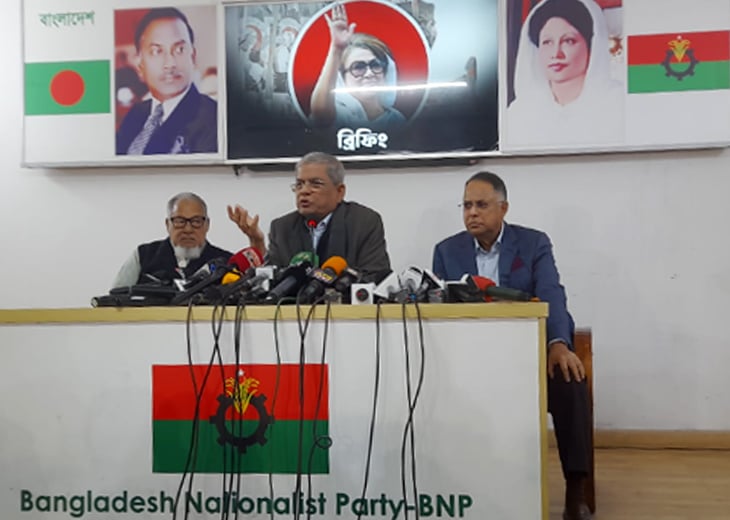News Flash
News Flash

DHAKA, Jan 2, 2025 (BSS) - Bangladesh Nationalist Party (BNP) Secretary General Mirza Fakhrul Islam Alamgir today said there was massive corruption in power and energy sector during the deposed prime minister Sheikh Hasina’s regime.
“If we go to power getting people’s mandate, we will review the Awami League government’s all agreements in power and energy sector to take necessary measures,” he told a press conference at BNP chairperson's Gulshan political office here.
BNP organized the press conference to reveal its analysis titled “Money looting and laundering through irregularities and corruption in the power and energy sectors in the last 15 years of Awami League regime”.
BNP Standing Committee member and former state minister for power Iqbal Hasan Mahmud Tuku presented a written statement at the press conference. Standing Committee member Nazrul Islam Khan was also present.
Mirza Fakhrul said Awami League is getting one kind of advantage due to debates and controversies in the country’s political arena now.
“The people will forget everything gradually if we don't continue talking about corruption and criminalization of Awami League regime," he said.
Speaking on the occasion, Iqbal Hasan Mahmud Tuku demanded disclosure of all agreements in the power and energy sector signed during Sheikh Hasina's regime.
The Awami League government has cut the pockets of the people in the name of making a magical change in power and energy sector, he said, adding that everyone who pays electricity bill is a victim of AL’s corruption in this sector.
“Actually, the Awami League had made the power sector a business sector. They understood that money can be looted quickly from this sector without any accountability. Because electricity is like air which cannot be seen,” he said.
He said the Awami League men have looted huge money amounting to around Taka 1,00,000 crore in the name of capacity charge in power sector in the last 15 years.
The former state minister for power said all agreements in power sector were inked without maintaining any public procurement rule.
He said the total expenditure in the power sector in 15 years was $2830 crore (Taka 3,33,940 crore) while almost one lakh crore Taka was looted in capacity charges.
Capacity charge was Taka 1,507 crore in 2008-09 fiscal year, it was Taka 5,000 crore in 2011-12 FY, Tk 8,900 crore Taka in 2018-19 FY and Taka 17,155 crore in 2022-23.
The power plants which were given in private sector did not work, he said, adding the AL had actually looted public money. He claimed that most of the machines of the companies that received capacity charges are bad as they earned money by bringing bad machines.
Mentioning about the top five companies in terms of getting capacity charges, he said Summit Group got Taka 10,630 crore, Agro International Taka 7,932 crore, Ultra Power Holdings Taka 7,523 crore, United Group Taka 6,575 crore and RPCL got Taka 5,117 crore taka.
Tuku said Quick rental power plants are usually used to solve emergency power crisis. These plants were for two years tenure but those are run for 15 years and 75 percent of these quick rentals were invested without any return.
In the name of importing power from India, they have paid Taka 11,015 crore in capacity charges in 9 years, he mentioned
The developments made in electricity during the Awami League government are not sustainable as the sector will collapse any time, he said.
About Rooppur nuclear power project, Tuku said Sheikh Hasina and her family looted 5 billion dollars from the project.
Further investigation is underway in London as there is allegation of more corruption against Tulip Siddiq, a British minister and niece of deposed Bangladesh premier Sheikh Hasina, he mentioned.
He also alleged that a clique, including former state minister Nasrul Hamid Bipu’s company, looted crores of taka in the name of the LNG project.
Tuku underscored the need for ensuring transparency and accountability in the power sector to prevent corruption and irregularities, increase public participation in the project implementation process, enact strict laws to prevent corruption, take action against those involved in power sector corruption and take measures to regularly monitor power inspections.